One of the things you get used to as a fantasy fan is that each new book is a commitment. Some people commit to other people, marriages, children, careers…. When fantasy fans start a new book, they do it knowing that they may still have to be reading about these characters 20 years later.
As a guide for those who maybe want a fling rather than a marriage, we asked Twitter to suggest standalone fantasies, and you did not disappoint: From Goblin Emperors to Fox Women to Raven Kings, here are 17 of your favorites!
Golden Key—Melanie Rawn, Jennifer Roberson, and Kate Elliott
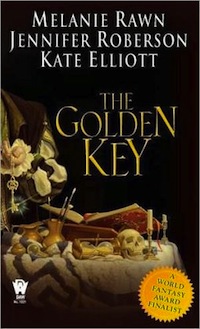
Golden Key was written in three sections by the three different authors, and follows multiple generations of the Grijalva family. The Grijalvas are a family of painters whose work subtly affects the course of life around them. Once in each generation, one of the women in the family is sent to Court to be the mistress to the ruling Duke’s Heir. However, their hold on their magical powers and influence in the Court is threatened when one of their members finds a way to extend his life, and becomes obsessed with preserving his first love at all costs.
Tigana—Guy Gavriel Kay
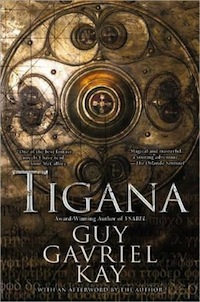
Tigana is an exploration of conquest and rebellion. Brandin, the King of Ygrath, and Alberico, a warlord from the empire of Barbadior, have taken over the Tigana province, and maintain a tense truce. Rebels try to keep the memory of free Tigana alive as they work to overthrow the rulers. Rather than being a straight story of revolution, the book is a nuanced look at power, patriotism, and how national pride shapes identity. Kay also gives us a fascinating mythical creature, called the riselka, which is based on the Slavic crop-nurturing water nymph called a Rusalka. In Tigana, seeing a riselka is a portent of great change in a person’s life.
Wheel of the Infinite—Martha Wells
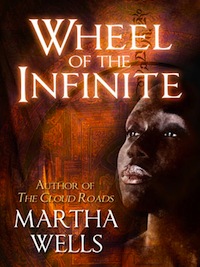
Wheel of the Infinite is an epic, in its way. Maskelle is the Voice of the Adversary, a priestess of very high rank within the Celestial Empire. When Maskelle rebels against the Celestial Emperor, she finds herself cast out from society. At the opening of the novel, she’s been summoned to the Temple for the remaking of the Wheel of the Infinite. But something is going wrong with the Wheel, and soon it becomes clear that only Maskelle and the swordsman Rian can save the world from calamity.
Deerskin—Robin McKinley
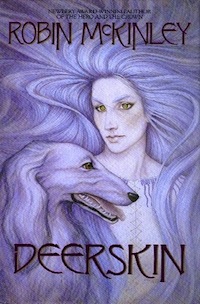
Deerskin is a tough, dark fairy tale about rape and its aftermath. It takes the French tale of “Donkeyskin” and delves into the emotions between the daughter and father, the daughter’s attempts to become a whole person apart from her family, and the magical powers that emerge as she grows older. In this story, healing is possible, but it doesn’t come from love or romance; it can come only with time. Lissar, the young daughter, is given this time, and channels her need for healing and family into caring for a family of orphaned dogs, until she’s finally ready to confront her past.
The Fox Woman—Kij Johnson
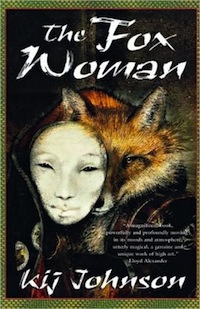
Like Wheel of the Infinite, The Fox Woman begins with a character who has fallen into disgrace. Yoshifuji, lover of foxes and ponderer of meaning, is forced to move to his long-deserted country estate after a problem at Court. His wife Shikujo is ashamed, but still loves her husband. His increasing preoccupation with the foxes worries her, as she knows how dangerous they can be. And then there’s Kitsune, a young fox who finds herself drawn to Yoshifuji. Will she become human to be with him? Will Shikujo reveal her own secrets? Will Yoshifuji be able to save his family from disgrace?
Jonathan Strange & Mr Norrell—Susanna Clarke
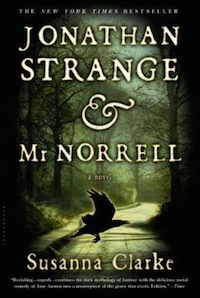
Susanna Clarke’s debut novel was a decade in the writing, but once released, it was hailed by fans of fantasy, Regency Romance, and alternative history. Here’s why:
“‘Can a magician kill a man by magic?’ Lord Wellington asked Strange. Strange frowned. He seemed to dislike the question. ‘I suppose a magician might,’ he admitted, ‘but a gentleman never could.’”
Who could resist that? The plot, briefly, is that Mr. Norrell, a cantankerous older gentleman, and Jonathan Strange, a more romantic younger man, bring magic back to England after a long period of extinction. The two men don’t agree on much. Naturally, the Duke of Wellington wants to use it for the Napoleonic Wars, and there’s talk of a Raven King, and emissaries from Faerie, but really the point of the book is to relax into another world on an October night.
The Night Circus—Erin Morgenstern
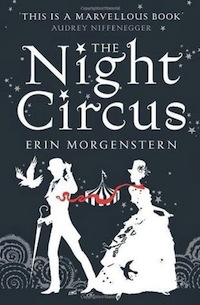
Erin Morgenstern’s The Night Circus is a piece of playful surrealism. In an alternate London, a wandering circus performs only from sunset to sunrise, appears without warning, and pack up for new locations with no notice. It soon attracts a group of obsessive fans who call themselves “rêveurs”—dreamers. Of course, the trick to the circus is that all the magic is real; and of course, there’s a dark side to all the fun. Best of all, the book scoffs at divisions between genre and literary fiction, and adult vs. YA.
The Last Unicorn—Peter S. Beagle
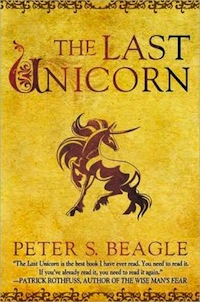
Does anything still need to be said about The Last Unicorn? Peter Beagle’s haunting fantasy, that perfectly balances elegiac prose with tough-minded plot twists, seems more like a perfect found artifact than a book written by a human. But in case you don’t know: Unicorn learns she is last Unicorn, must defeat Red Bull and Evil King to save other Unicorns. Schmendrick the Crap Magician must become better at Magic, help Unicorn. Molly Grue, Former Idealist, must help Unicorn, while mourning the loss of her youth. The book works as both a commentary on fairy tale and fantasy tropes, as well a genuinely moving story in itself.
The War of the Flowers—Tad Williams
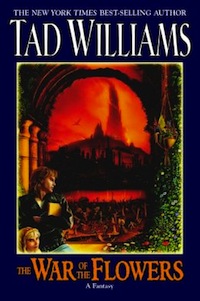
Sort of a rock’n’roll Neverending Story, The War of the Flowers starts as one type of book and quickly becomes another. Theo Vilmos’ life quickly goes from not-great to terrible: To start, he’s turning 30, but as a rock singer, has to surround himself with much younger guys. He’s beginning to wonder if he’s wasting his time. Then his girlfriend miscarries their child and dumps him, and he learns that his mother is dying of cancer. Unsure how to continue his life, he retreats to a cabin to read his great-uncle’s fantastical book about Faerie while he considers his future. But then, as he learns that the book isn’t exactly fiction, he finds that his future might be decided for him…
Swordspoint—Ellen Kushner
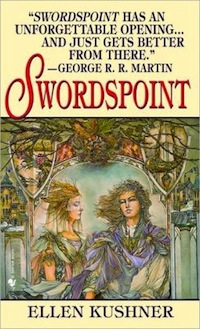
Are Alec and Richard St Vier in love? Or are they dueling? Is there a difference? Ellen Kiushner’s foundational mannerpunk novel tells an intimate story of twisting emotions, court intrigue, and drinking chocolate, where a city’s fortune turns on the latest gossip. The rigid class system demands that men’s honor be upheld through combat when necessary, and Richard St Vier, a Master Swordsman, can take contracts as he chooses. But when Alec is kidnapped by one of the city’s most powerful Lords, St Vier has to decide how far he’s willing to go to get him back.
The Folding Knife—K.J. Parker
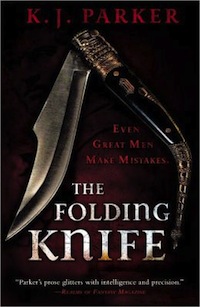
The mysterious K.J. Parker gives us an equally mysterious book with The Folding Knife. We follow a man named Basso Severus, once powerful and feared, as he leaves the Republic in poverty. Why? The next 400 pages chronicle about 30 years of his life, through war, economic collapse, family tragedy, and murder, all the while teaching us the history of the knife he carries with him. This isn’t a conventional epic fantasy.
Song of the Beast—Carol Berg
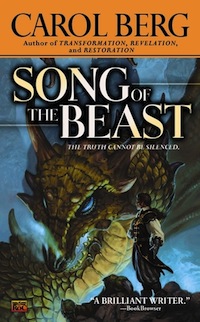
Carol Berg’s Colorado Book Award-winning novel asks, “How much is required of a man chosen by a god?”
Aidan McAllister was the most famous musician in his kingdom, until, upon turning 21, he was imprisoned by the king. Now, 17 years later, his hands and voice are ruined; he has no hope, no future, and no idea why he was jailed. But he is determined to find out the truth and face his enemies. His quest will involve dragons, non-humans, and exposing the truth about the pantheon of gods that rule his society.
Those Who Hunt the Night—Barbara Hambly
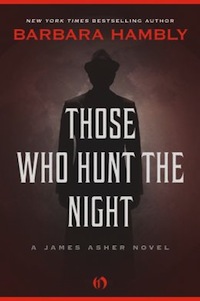
When Tor.com ran an excerpt of Those Who Hunt by Night a few years ago, Ms. Hambly wrote an introduction, where she talked about her original idea:
…I thought, “If someone was murdering vampires in their lairs during the daytime, they’d have to hire a Day Man to do the investigation. And they’d have to kill him afterwards.” And then, “If he was smart enough for them to need his help, he’d be smart enough to know what they intended to do.”
The novel, set in the early 20th century, travels from Paris to London as the Day Man, James Asher, recruits his physician wife to help him unravel the mystery, while keeping a few steps ahead of his employers.
Rats and Gargoyles—Mary Gentle
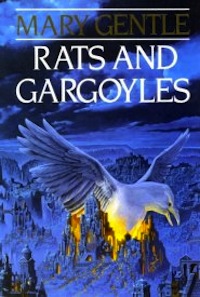
On the one hand, Rat Lords have decreed that all humans are their slaves. On the other, God-Daemons have decided to end all of existence. With the odds stacked against them, a small group of humans led by White Crow attempt to start a revolution. She is helped by a Prince who refuses the shackles of slavery, and a young Katayan woman who is destined to become humanity’s Living Memory. With so much power working against them, will they be able to create a magic strong enough to save themselves, let alone all of humanity?
Emerald House Rising—Peg Kerr
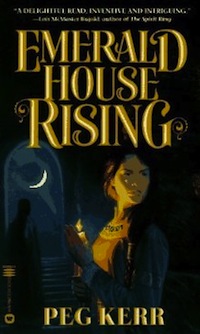
Jena is the daughter of the Gemcutter. Her father supplies jewels and amulets to royalty, and more than a few of them have their own magic. She has learned well, and even created a few pieces of her own, but the law of her land says she must marry, not carry on her father’s work. However, as her own magical abilities grow, the powerful Lord Morgan recognizes her gifts, and realizes that she must set out on a far different path than an ordinary girl. The two will have to become true partners if they are to avert a war—and save the kingdom.
Elantris—Brandon Sanderson
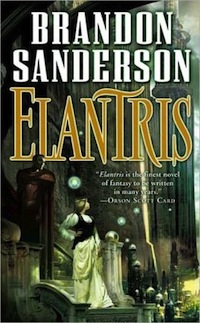
Elantris was the luminous capital of Arelon until its magic failed. Now the Elantrians, once demigods, are as shrunken and powerless as their city is fallen and ruined. When Princess Sarene arrives to wed the Crown Prince, Raoden, she hopes to find love and bring hope to her new people. When she finds that Raoden is dead, she still attempts to protect her adopted city from the cunning of the usurper Hrathen. As the two struggle, neither suspects the truth: Prince Raoden lives, cursed, but still working to uncover the secret of Elantris’ magic, and restore Arelon to its former glory.
The Goblin Emperor—Katherine Addison
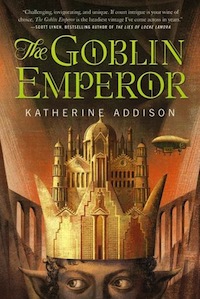
One of the most delightful books of the year. Maia, half-goblin, must rule a nation of caste-obsessed elves, most of whom hate him. He is the rare emperor who doesn’t want to rule, but as he gets drawn into Court intrigue, he soon learns that he may be the best half-elf for the job. This is a fantasy novel that doesn’t concern itself with epic battles, dragons, and fair maidens; instead it focuses on bureaucracy, court intrigue, and the ongoing murder investigation that becomes all the more labyrinthine as Maia draws nearer to his father’s assassins.










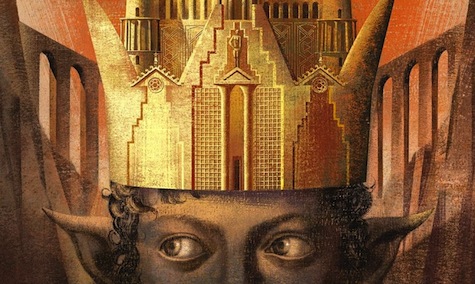
Are these books that can be read on their own, or books that have no sequels? It’s worth noting that there is a sequel to Swordspoint, Ellen Kushner and Delia Sherman’s The Fall of the Kings. (And two more set in the same world/city, but since they’re set about two decades later and I haven’t read them, I don’t know if they’d count as sequels or not.)
Was hoping Zelazny’s “Forever After” would be on here.
I feel this list lack some Gemmell.
Waylander or Legend perhaps.
(and really, more from Kay).
Good selection. Not enough people are writing good standalones these days, probably because unless you only write one book or have been around a while, it is easier to do a sequel than redo your worldbuilding from scratch.
Personally I would have gone with The Lions of Al-Rassan as my GGK, and added both Good Omens & The Forgotten Beasts of Eld, but good list.
edit: And Master of Whitestorm.
Poul Anderson wrote a couple: The Broken Sword and Three Hearts and Three Lions. The latter is somewhat open-ended, the former … not so much.
A biggie (and a classic):
The Lord of the Rings.
This was written as a singe stand-alone novel; because it was so big the publisher insisted it be broken up into 3 books. JRRT did NOT set out to write a trilogy; nor did he in his lifetime write (or plan to write) any sequels…
The Snow Queen does have sequels (one is The Summer Queen, and there’s another whose title I forget). And besides, it’s science fiction. (Standalones are more common in science fiction, though the dreaded trilogy is making inroads there as well.)
gregmce@1: The Privilege of the Sword is actually a more direct sequel to Swordspoint; although it was written later than Fall of the Kings, it is set earlier, and Alec and Richard are in it. I wasn’t aware of a fourth, though. (And while Swordspoint works perfectly well as a standalone, I don’t think Privilege does; it ends rather suddenly, and while the main plotline is resolved, you are left thinking ‘but what happened to so-and-so?’.)
Elantris was one of the books that made me love fantasy. I’ve read that Brandon Sanderson may write a sequel to it eventually. When I finished it I wanted more, not that it needed more. It is one of the few books I reread.
Hooray for Swordspoint! Also, Maggie Stiefvater’s The Scorpio Races.
Please, please go and read The Goblin Emperor. So amazingly amazing.
Great books, though The Golden Key has a prequel (The Diviner) and there were plans for two additional books to be written in that universe, which I believe have fallen through because of life and stuff.
All of the books on the list do stand on their own, though (at least the ones I’ve read)
Very cool. Looking over all the Fantasy books I’ve read over the last few years, it’s kind of shocking how few are standalone. (Ditto SF)
I’d add to the list:
Robert Jackson Bennett’s The Troupe
Neil Gaiman’s The Ocean at the End of the Lane.
Those Who Hunt the Night has sequels too… It is great, but I think the second one, Travelling with the Dead, is even better.
I’m going to throw my 2¢ in for Lyonesse by Jack Vance. Even though he later wrote sequels, it was originally a standalone novel, and can be thoroughly enjoyed without reference to the sequels.
Martha Wells’ “The Element of Fire” and “Death of the Necromancer” are also great as stand-alone books. They happen to be set in the same world, hundreds of years apart (and the trilogy Fall of Ile-Rien happens about 20ish years after Necromancer, and features a couple of the same characters), but they are also completely self-contained and you don’t need to read any of the other books to enjoy them.
One I’ve always enjoyed in the Heroic Fantasy vein is Mike Stackpole’s Talion: Revenant.
I’ve always been very partial to Gael Baudino’s Gossamer Axe novel. Sad;u it appears to be out of print.
http://www.amazon.com/Gossamer-Axe-Gael-Baudino/dp/0451450256
K.J. Bishop’s the Etched City is the best stand alone I’ve read.
Pretty much any of Patricia Mckillip’s books are stand alone and wonderful.
One of my favorite fantasy stand alone novels is Regina’s Song by David Eddings.
Thanks for reading my musings,
AndrewB
I’d like to add Janny Wurts’ “To Ride Hell’s Chasm” (2002). Excellent, fast-paced standalone fantasy.
Richard Kadrey’s Butcher Bird might fit.
Would Varley’s Golden Globe also fit?
Mieville’s Kraken defintiely would.
McKinley’s Pegasus is also a good standalone, if more or less YA oriented.
Second the thought above that there are many excellent Guy Kay standalones. Ysabel is another one.
Sprit Ring by Bujold. Not her best but still good (and very reminiscent of a Guy Kay style).
As noted, Those Who Hunt the Night has sequels, but Hambly’s Bride of the Rat God (honestly, best title ever), despite years of promises, still doesn’t. Sigh.
All of A. Lee Martinez’ books are standalones – I recommend starting with Divine Misfortune (the nature of the divine and how worshippers might not mean everything they say) and The Automatic Detective (sentient robot detective noir).
@14 While THOSE WHO HUNT THE NIGHT does have sequels, that novel’s story is self-contained and one does not have to read the sequels to get to a satisfying conclusion of the story it tells.
I think that was the main criterion for inclusion on this list: that the novels mentioned can be read “alone” and are not “Book 1” of some open-ended story that takes up a trilogy, tetralogy, or otherwise ongoing series, even if they do have sequels that continue in the same world with the same characters.
If that’s the case, I’d also add BRIDGE OF BIRDS by Barry Hughart. Although there are two sequels that continue with the two characters, they have no bearing on the events or aftermath of the first book.
@25–Uh, no, not Pegasus. Lovely book, but it has a horrible cliffhanger ending and the sequel’s not even out yet. Everything else McKinley’s written could go on this list–and Deerskin was an excellent choice–but not that one.
I definitely need to pick up some of these!
So I just went back through my whole collection and it is really apparent just how few standalone works there are. Some really good duologies are as close as they get, most fantasies eventually have sequels added later. A lot of the recent editions are collections of linked stories.
How do generally related stories work – can we fit any of Charles de Lint in? Moonheart for example is relatively standalone.
David Gemmel’s books would fit that as well, and a lot of Modesitt’s Recluce books build off each other but stand alone.
True singletons :
Emma Bull – War for the Oaks.
Neil Gaiman’s – Neverwhere & Stardust.
Tim Powers – The Anubis Gates.
Robert Westall – The Cats of Seroster
Fool on the Hill by Matt Ruff is an excellent candidate for this list. (Indeed, Ruff’s entire canon is excellent, but I have a particular fondenss for Fool.)
I’d also recommend Judith Tarr’s A Wind in Cairo and a novel by Pat O’Shea (nominally published as a YA) entitled Hounds of the Morrigan.
And one stretch of the premise: Mercedes Lackey’s By the Sword is technically a part of her extended cycle of Valdemar novels, but it’s the one out of the whole cycle that really works and works well as a stand-alone. It’s also one of Lackey’s strongest books, period, IMO, as it sidesteps many of the problems for which Lackey’s work is often criticized.
And a second to RussellH’s recommendation for Bridge of Birds, plus two additions (if you can find them). In the wave of Asian fantasies that followed Hughart’s debut, two books stood out for me: Kara Dalkey’s Nightingale, a gorgeous recasting of the Andersen fairy tale with a Japanese setting, and M. Lucie Chin’s The Fairy of Ku-She, a beautifully done rendering of Chinese mythological adventure.
@29: I was all set to say exactly the same thing about Pegasus.
Steven Brust is best known for his Dragaera series, but he’s written a number of excellent standalones as well. I highly recommend The Sun, The Moon, and the Stars.
Emma Bull’s War For the Oaks is one of the seminal books of urban fantasy as a genre, plus it’s just a really fun read.
Sean Stewart is a great writer who runs mostly to standalones. Nobody’s Son is a take on fairy tales; Mockingbird is urban fantasy in Texas instead of Minnesota.
John M. Ford’s The Dragon Waiting is a masterpiece of alternate-historical fantasy.
The Curse of Chalion, by Lois McMaster Bujold, has two other books set in the same world, but stands on its own just fine. And it’s great.
@31: Augh! How could I forget The Anubis Gates? I’m also really fond of On Stranger Tides.
Brandon Sanderson has another excellent standalone fantasy which nicely shows his growth as a writer since Elantris. It’s called Warbreaker and has two heroines and an interestingly different flavor from the earlier book, including some humor. Of course, it also has the ingeniously different magical system you expect from Brandon.
Oh, and don’t be misled by the title. There’s no war in this book nor any military content to speak of. The title is an honorific applied to one of the characters.
We were fortunate enough to get an endorsement from the great Michael Moorcock, who makes a clever reference to the breath magic of the book: “Not only has Sanderson drawn a freshly imagined world and its society, he has also given us a plot full of unexpected twists and turns. . . . Anyone looking for a different and refreshing fantasy novel will be delighted by this exceptional tale of magic, mystery and the politics of divinity. Warbreaker might even take your breath away.”
Oh, and speaking of Moorcock, he wrote one of the best fantasy standalone novels of all time. It’s called Gloriana, and it’s a masterpiece.
Concerning Brust, I would also recommend Brokedown Palace; it is set in the world of Dragaera, in which he also has two series, and includes some small overlaps (someone is someone’s mother), but stands by itself and is very different in nature. (The two series are inspired respectively by tough-guy crime fiction and by Dumas; BP is inspired by Hungarian folk tales.)
Hilari Bell, A MATTER OF PROFIT – one of my favorite non-series books from ages and ages ago. But I second THE GOBLIN EMPEROR on this list – I’ve already read it twice, and it’s so utterly delightful I know I’ll cherish and reread again.
@29 – checks interwebs. McKinley is doing three books in this world, but they are supposed to viewed LoTR style as one big standalone book. Hmm. Had no idea she was continuing with this world.
How come no one has yet mention John Crowley’s incomparable (and completely standalone) Little, Big?
I’d like to nominate Dragonsbane by Barbara Hambly as another good stand-alone fantasy. Yes, there are sequels, but this is a complete story in and of itself. It’s a lovely story with dragons and an appealing middle-aged female protagonist.
The Goblin Emperor is an amazing book. It’s a delight to read (and reread); I highly recommend it.
Rats and Gargoyles[b]—Mary Gentle[/b]
AS Charles Stross just reminded me–it does have a sequel of sorts, THE ARCHITECTURE OF DESIRE
I second Gossamer Axe! Wonderful book. Also all the Gaiman things. And I would add Stephen Brust’s lovely Ariel, and (even though it has a sequel, you definitely don’t have to read it) RA McAvoy’s Tea with the Black Dragon, one of the best of the gazillion books I’ve read. :)
Good suggestions here! Brust’s “Brokedown Palace” is one of them.
Also, Guy Kay (whose “Tigania” is mentioned in the article) has written other stand alones that are very good. “A Song for Arbonne”, “The Lions of Al-Rassan” and “Under Heaven” are all worth reading.
Oh, and RA McAvoy’s “Tea with the Black Dragon” does have a sequel called “Twisting the Rope”. Good read. How can you not love Oolong?
Nice list. Of the books on this list I’ve already read, I wholeheartedly second the recommendation, because I love quite a few of them; of the ones I haven’t read, I am intrigued.
Some other goodies: “Tooth and Claw” and “Among Others” by Jo Walton. “The Book of Atrix Wolfe” by Patricia McKillip (any number of Patricia McKillip’s are standalones, actually) and “The Porcelain Dove” by Delia Sherman.
Thanks for this list. Now that I’m getting into my decrepit old 60’s (The Golden Years: They Kinda Suck), when I see the start of a new series, I have to consider who’ll end first: the series, or me. Standalones are gratefully appreciated.
dixiehellcat@43: You mean Stephen Boyett, not Brust.
RobMRobM@39: Are you seriously telling me you finished reading Pegasus and thought that was the end of the story? As opposed to a massive cliffhanger?
Good list and good additions.
Guy Gavriel Kay is one of my all time favorites; his latest two, Under Heaven and River of Stars are outstanding. I think Rob Holdstock’s Mythago Wood has a sequel but it does stand alone and also stands out from the pack. Another favorite is Christopher Moore’s Lamb: The Gospel According to Biff, Christ’s Childhood Pal. Cannot forget Jonathan Carroll and Graham Joyce; both are terrific writers and most of their work stands alone.
Very good list, but mostly very recent books. Try E.R. Eddison’s The Worm Ouroboros and C.S. Lewis’s beautiful retelling of the Cupid & Psyche myth, Till We Have Faces.
I second John Crowley’s “Little, Big” as one of the best fantasy novels of the modern era.
Other good ones: Mark Helprin’s “Winter’s Tale,” Richard Grant’s “Rumors of Spring,” and (yes) Toni Morrison’s “Beloved.”
The Swordspoint has two sequesl, ‘The Privilege of the Sword’ and ‘The Fall of the Kings’ plus a whole host of short stories and novellas like ‘The Swordsman Whose Name was not Death’ , ‘The Man with the Knives’ (its a must read after the Swordspoint series), ‘ A Wild and Wicked Youth’ and another one whose name I have forgeotten!
I may have missed it in the comments, but Steven Brust’s “Brokedown Palace” stands on its own quite well. Lord Dunsany’s “The King of Elfland’s Daughter” was written as a stadalone novel, and everything by James Branch Cabell stands on its own. Insofar as I know, Neil Gaiman hasn’t written anything that had a sequel to it, although I may be wrong. And while they may be part of a larger universe, Glen Cook’s “Garrett, P.I.” novels each stand alone very well; it’s only when read in sequence that the larger tapestry is revealed.
The Golden Key is a three-book series, not a standalone (at least that is how it is published in German).
Some German authors:
Michael Ende’s The Neverending Story and Momo.
Hans Bemmann’s The Stone and the Flute.
Otfried Preußler’s Krabat (The Satanic Mill in English).
Many of Wolfgang Hohlbein’s books are standalones.
The Etched City by K.J. Bishop.
The works of Sean Stewart
There also are several novels that follow Hambly’s “Those Who Hunt the Night” – including the latest “The Kindred of Darkness” – love all her series! Her only true standalone is “Bride of the Rat God” – which is awesome!
Two very deserving standalone fantasy novels that aren’t on this list are Nnedi Okorafor’s “Who Fears Death,” post-apocalyptic epic fantasy with an unforgettable female protagonist, and Karen Lord’s “Redemption in Indigo,” mythic fiction based on a west African folk tale.
Nalo Hopkinson’s books are all stand-alone, and make interesting use of Caribean-influnced folklore and language. I’ve read and enjoyed “Brown Girl in the Ring,” “Midnight Robber,” and “The New Moon’s Arms.”
Speaking of folklore, two good stand-alones making use of the same Scottish legend: “Tam Lin,” by Pamela Dean and “Fire and Hemlock” by Diana Wynne Jones.
For the sheer beauty of the prose, Sofia Samatar’s “A Stranger in Olondria.”
The Golem & The Jinni by Helene Wecker. I was actually so disappointed when I finished it and remembered it wasn’t a series. Fabulous characters, fabulous layered storytelling, fabulous mythological elements.
In addition to Swordspoint, I’d also throw a shout-out for Ellen Kushner’s Thomas the Rhymer.
Also C.J. Cherryh’s The Paladin.
I think The Eyes of the Dragon by Stephen King is a perfect all-in-one fantasy book.
How can you possibly have missed out Richard Calder’s Malignos? Or Frenzetta? Or Impakto?
They all belong in the one “Universe of Discourse” The Children of the Perverse, but occur in wildly differing segments of it that tend to contradict each other.
Although I’ve only read four of these, and some in the comments, I have to absolutely give my vote to Tigana, the Best Fantasy Novel of all time. Once you read it, you’ll know what I mean.
people always complain about these lists. Books that should or should not be included. Get a grip. These lists are subjective. If you don’t like them, make your own and post it. I enjoy seeing these lists and others simply as they are someone elses viewpoint. That is how we learn and how we discover books we may have missed or forgotten.
@48 – I guess so. As context, my daughter got the book from the library. I borrowed it, ran through it in a day, and was suprised by how much I liked it. I must have assumed it was intended as a standalone book (not marketed as part of a series) and I’d never read the author before so I had no basis for comparison of her style.
First of all, all the mentions of Stephen Brust, all of them good, but none of them including my personal favorite, To Reign In Hell. Possibly my favorite fantasy novel ever. And although Brust is still writing, I’m fairly certain there won’t be any sequels to this one.
But before leaving the subject, I wouldn’t hesitate to recommend Agyar or Freedom and Necessity either.
Just got a great laugh from the inclusion of Tigana, and all the agreement comments on it. Somebody loaned me Tigana YEARS ago (like, 15 or so), and it’s been sitting on my shelf waiting for me to get to it, because the person who loaned it to me didn’t usually read fantasy, so I didn’t really put much faith in their recommendation. It was a “oh remember you told me you like fantasy novels? Here try these.” moment and handed me a couple of really beat-up books that I had never heard of by authors I’d never heard of. She kind of had an “I didn’t like them but maybe you will” tone in her voice, so I just said thanks and put them on the shelf in case I ever got desperate for something to read.
It’s funny that one of those, Tigana, is being recommended (and seconded) here as one of the best stand-alone fantasies out there, and I’ve been ignoring it as presumably sub-standard all this time. But it’s doubly funny because the other book she loaned me at the same time:
wait for it…
A Game of Thrones.
@50 FWIW The Worm Ouroborous (a remarkable and wonderful book) was followed by a trilogy set in the same world and involving a few common characters; but it was decidedly a step down in quality from my viewpoint…
Tabby – funny story!
Yes, Tigana is very good. I wouldn’t put it in the great category but it comes immediately to mind when thinking of a strong standalone fantasy story. But Kay is like that – lots of good standalone or two book works. I’d also strongly recommend Under Heaven, which I thought was truly outstanding – probably my favorite Kay.
I also thought about mentioning Brust’s To Reign in Hell. Interesting work.
I came to Kay late, and honestly wasn’t that impressed with Tigana. Read alongside The Lions of al-Rassan, Under Heaven, or the Sarantine Mosaic, it comes off as one of his weaker works. (Not surprising, since it’s also one of his earliest ones.)
But there cannot be enough praise in the world for Under Heaven.
Some really great recommendations here. You’ve bumped up my reading list for quite a while with these. Thanks. I must admit, I normally prefer fantasy books in a series. When they are that good, it’s hard to accept that you don;t get to read any more of it. I just finished reading Circle of Reign by Jacob Cooper and I am just itching for the next one. Truly outstanding writing that totally hooks you in and it would almost be a crime not to follow it up. Well worth checking that one out of you aren;t aware of it. http://www.circleofreign.com/
Not already mentioned unless I missed it:
Martha Wells, City of Bones
Steven Brust & Emma Bull, Freedom and Necessity
Jo Walton, Lifelode
With regards to Brandon Sanderson, you first have to define what you mean by “sequel”. Nearly all his books take place in the same universe (the Cosmere), if on different planets.
Though, even without that, both Elantris and Warbreaker have sequels planned, so it’s more like the ultimate sequel-waiting game: you don’t even know when you’re going to get ’em.
Though, I think the most brutal wait Sanderson’s forcing his readers into is the final book of the Alcatraz series. I think the series was intended to end on a perpetual cliff-hanger as part of the joke, but there’s no way readers were going to let him get away with that, so I’ve heard he may actually write The Dark Talent at some point (here’s hoping).
One more I just thought of, almost impossible to find these days.
Villains by Necessity by Eve Forward. A delightful parody of D&D of a world where Good has finally triumphed, and the plucky Evil rebellion trying to restore things back to balance.
@Tabbyfl55
Love it! Especially if GoT is still on the shelf with Tigana, while you decide whether the unknown author is worth a punt ;)
@69
There was a great line in a review of Under Heaven which honestly could be applied to any of his works.
You should read this book if you have an appreciation for expertly
crafted, character-driven fantasy of the highest order; if you want to
really get to know characters, to get a deep sense of them, and their
place in their society and their role therein; if you want to close a
book’s back cover, take a deep breath, set it down, and not even
consider picking up another book until you’ve had time to just
appreciate the raw artistry you’ve just witnessed.
You list The Night Circus as by Eric Morgenstern. Fix?
Robin McKinley’s Sunshine.
(Her response to people who want to see other books in that universe: “So do I!”)
A few from what I call “the best author you’ve never heard of,” Doranna Durgin:
A Feral Darkness (urban fantasy)
Seer’s Blood (rural fantasy)
Wolverine’s Daughter (straight-up quest fantasy)
All of these are out-of-print, rights-reverted, and can be found as self-published ebook “reprints.” All three feature strong female protagonists, with Seer’s Blood and Wolverine’s Daughter also featuring a touch of “coming of age” themes (although it’s not the main focus).
Barrenlands is another of her fantasies that can be seen as “stand alone,” but is actually a “prequel” to her “Changespell” saga. (It’s set in the same world, but about 200 years before the events in the first Changespell book, Dun Lady’s Jess. Which, just so you know, can also be read as a stand alone…)
I haven’t read about half of the ones on the list, I’ll have to try them out!
I’ll second Curse of Chalion and Sanderson’s Warbreaker (sequel planned, but it stands alone).
And I would recommend the following (although I suppose they may be ‘middle grade’ fantasy):
Howl’s Moving Castle by Diana Wynne Jones
Sorcery & Cecelia, by Patricia C. Wrede
Beauty, by Robin McKinley
Ella Enchanted, Gail Carson Levine
And really, most of the Discworld novels could count as stand-alone books. I recommend Going Postal.
Mix in Chinese mythology with the Ghost Bride (Yangsze Choo).
Any Beth Hilgartner. (though Business of Ferrets’ third book, still waiting, still waiting)
Also, the Princess Bride.
Last, the Hobbit.
I am surprised and amazed that one of the greatest literary fantasy novels of all time was not even mentioned in the comments section. That would be: John Myers Myers SILVERLOCK. It is a tour through literary history with references to just about very classic literature trope ever written, all packaged up in a rollicking good adventure. It’s extremely fun to try and spot ALL the literary references, and very nearly impossible. There is a novel that was labeled a sequel, “The Moon’s Fire-Eating Daughter,” but really it is not a sequel, merely another novel written in the ‘style’ of SILVERLOCK, and itself needs reference book to “spot the source” of JMM’s literary source-play (though not nearly as well done as SILVERLOCK). I guess books that aren’t newly fit into the pop-culture of current tastes DO get short shrift today.That is very sad.
At least someone mentioned the phenominal, unsurpassable book by John Crowley, LITTLE, BIG.
To Ride Hell’s Chasm by Janny Wurts and Joe Abercrombie’s The Heroes
First time commenter on any Tor thread, but I feel compelled to mention “The Once and Future King” by TH White. I Know that “The Book of Merlin” is sometimes published in the same volume or separately, but it’s not necessary if it’s missing. The Arthur myth is probably my all time favourite, but apart from that, this book has such humanity and tragedy, I just love it. I literally tear up at the end of Book 1.
I also need to shout out to “Time and Again” by Jack Finney. Hard to categorise, maybe fantasy, maybe SF, involves time travel to 1880’s NYC. Brilliant and fascinating. Had a sequel 20 years later – not necessary and probably just a pension top-up.
I regularly re-read both and recommend them.
@73 – Mayhem
Aha! But no! That story’s even funnier, and pertinent to the topic! Want to hear it? Good!
Many years later after shelving those books and forgetting about them, I found myself in the bookstore, masochistically looking for a new series to start that was actually finished, unlike the damn Wheel of Time that I had optimistically started because it’d been out so long it must be finished, right?
So I see the four (that’s right four) GRRM books on the shelf. Those same four books had been there for a while. Hadn’t really heard anything about them, but what’s this? “Soon to be made into an HBO series”, WELL! If HBO is going to be making a series out of it, then a) it might be worth reading and b) it’s gotta be finished, right? RIGHT? So I optimistically bought a brand new copy of Game of Thrones and took it home and started reading and became a ravenous fan.
It was a long time after that, that my wail of agony and despair was heard echoing throughout the halls of … whereever I was when I got to the end of book 4.
And it was even longer still before I discovered my other, much older, copy of Game of Thrones, and remembered how I got it.
Funny that I didn’t take a second sidelong look at Tigana then, come to think of it.
#71 OtterB Thank you for mentioning City of Bones by Martha Wells! I remember finding this in my library wanderings as a youngster and being completely enthralled by the world she created.
One book immediately came to mind for me: Clive Barker’s Imajica. Big, beautiful, and wonderful visions and creatures. Perhaps my favorite Barker novel to date.
A third vote for Bridge of Birds. One of the greatest fantasy novels of all time, and one which never gets enough attention.
Put me down for any and all of GGKay’s standalones – also I adored Under Heaven but River of Stars was too similar and lacked the emotional impact IMHO
City of Bones was excellent
McKinley’s Beauty, The Blue Sword, Sunshine are classics
I was surprised how much I enjoyed The Goblin Emperor
Throwing out a few random ones
Judith Tarr – A Wind in Cairo
Janny Wurtz – To Ride Hells Chasm
Katherine Kerr – Snare
snowcrash
Another older classic: Hope Mirrlees, “Lud-in-the-Mist”
83. emu47
True: Weaveworld‘s well worth reading too. Then you have Salman Rushdie’s Grimus and Midnight’s Children, which people here don’t seem to have noticed. Too unbelike, probably.
So happy to see Martha Wells’s books recommended here. I don’t think enough people know her writing.
Adding to the list: Vonda McIntyre’s “The Moon and the Sun,” also “Dreamsnake” — both standalone, nothing to do with each other but excellent.
Also Gillian Bradshaw, “Island of Ghosts.” Fantasy, not fantasy? Definitely epic, and who cares.
Weird that China Miéville isn’t mentioned more often, each and every one of his books’ a standalone. Railsea is a masterpiece, much better than the aforementioned Kraken.
Brust is just great, whether in Dragaera or outside of it. However last year’s The Incrementalists wasn’t quite up to par, IMO.
I enjoyed Paul Kearney’s first three books published two decades ago and reissued by Solaris this year, each a standalone with a loose tie to the other two: A Different Kingdom, The Way to Babylon and Riding the Unicorn.
The Years of Rice and Salt by Kim Stanley Robinson.
I love this list! I have read too few of these, but those I did, I really enjoyed, so I will try to get hold of the rest. Both the initial list and those from the comments. I feel those books that someone says they’re their favorites got to be real good.
This is why I thought you should mention Roger Zelazny’s Lord of Light, unless you think it is SF and not Fantasy (I’m not sure). It’s the one book I have placed second on my all-time favorite list, next to Lord of the Rings. Really well written and thoroughly enjoyable.
Also, as someone mentioned, Good Omens. A book that has so many rereads does so for a reason.
@91 – I love Zelanzy standalones, including LoL and especially This Immortal (which tied for the Hugo with Dune when it came out) but I considered them to be SF.
Gossamer Axe by Gael Baudino
@@@@@
Ignolopi view all by Ignolopi | Tuesday November 25, 2014 01:09pm EST Flag | Bookmark ‘And I would recommend the following (although I suppose they may be ‘middle grade’ fantasy): Howl’s Moving Castle by Diana Wynne Jones Sorcery & Cecelia, by Patricia C. Wrede ‘
Both of these have sequels.
Tiger Burning Bright by Marion Zimmer Bradley, Andre Norton and Mercedes lackey is a good read with the three lead characters being grandmother, mother and daughter. It’s a rare pleasure having a middle-aged woman as a main character let alone an old one.
Not sure that one counts, as von Lipwig is a recurring character. Anyway, I will always have a soft spot in my heart for Small Gods.
Also, I think it may be fun to suggest Dune. First, because it totally is fantasy, not SF, and second, because there were never any sequels.
@95 Ha. I had the same thought earlier in the thread, except that it is a sci-fi novel rather than fantasy.
Thank you all! After looking at my recent reading list, I have very few standalone books. Considering my fear and loathing of the dreaded ‘cliffhanger’ (which is a cheat, IMO), I am happy to be able to add many, many books to my TBR pile.
I’ve already recommended this one, but I’ll do it again – A Face like Glass by Francis Hardinge.
James H. Schmitz–“The Witches of Karres”. Magic and Spaceships; a character named THE Leewit (not Leewit); a planet that circles its sun in a retrograde motion; what more could you ask for? (except a sequel, alas!)
While Those Who Hunt the Night by Barbara Hambly is technically a stand-alone novel, there are 3 additional novels containing the same characters at progressively later points in chronology. You can technically read any of the 4 seperately, however, there are references made throughout to events or character developments that occurred in the previous books.
Like jsherry said above, The Golden Key was never meant to be a standalone title. There were some pretty ambitious plans for each author to follow up with their own novel, but the whole project got delayed by Melanie Rawn’s difficulties. She finally did her part, and gave us a half-decent prequel with The Diviner (I say half-decent, because half the novel was fantastic, and half forgettable), but I doubt we’ll ever see the others.
I didn’t care for Jonathan Strange & Mr Norrell (it might have made a decent novella, if gratuitously edited), but Elantris and Goblin Emperor are high on must read list.
Cuckoo Song by Frances Hardinge, Archivist Wasp by Nicole Kornher-Stace, and An Inheritance of Ashes by Leah Bobet are all great standalones.
You could include Keith Brooke’s Riding the Serpent’s Back to this list. I know that he is not as well known as the other authors, but that doesn’t mean he’s not as good.
I second Leah Bobet’s Inheritance of Ashes, which is a wonderful, haunting tale set in a world that might be ours. Most of Patricia McKillip’s work is standalone; even the trilogies and duologies, by today’s standards, are the size of single epics. The Forgotten Beasts of Eld was one of my favorite introductions to fantasy. The majority of McKinley’s books are also standalone and wonderful fantasies. Franny Billingsley’s Chime is a creepy, charming, eccentric fantasy deserving of more attention. Janny Wurts’s Sorceror’s Legacy is another of my favorites. I have read Emma Bull’s War for the Oaks too many times to count. One of my guilty pleasures is Laurell K. Hamilton’s Nightseer. Lilith Saintcrow’s Steelflower can no longer be called standalone, since she is writing the sequel. I highly recommend Marta Randall’s The Sword of Winter if you can find a copy.
Good list; good comments. But, the best book ever written just happens to be a standalone fantasy novel that no one has mentioned yet: The Phantom Tollbooth.
Others on my list of best standalone fantasy novels: Declare, American Gods, Weaveworld, The Curse of Chalion, The Last Unicorn, Perdido Street Station (the Bas-Lag books are not a trilogy; just three unrelated novels set in the same world), Avram Davidson’s The Phoenix and the Mirror, and, let’s go back to Gaiman to get up to ten: Neverwhere and Stardust.
Definitely on my “gotta read these, but just haven’t gotten to them yet” are Tigana, Little, Big, Mythago Wood, and Bridge of Birds.
The trouble with this is we get so used to expanded universes and getting sequels and more of what we enjoy. Even many years later we eventually got a sequel to Watership Down. I would love to see more from The Goblin Emperor‘s universe and it really hurts that it’s standalone because it created a world where you know so much happened! And the main character is so lovable, who wouldn’t want to keep seeing him?!
Faerie Tale – Raymond E. Fiest
REALLY GOOD STAND-ALONE FANTASY/ MYSTERY/ THRILLER.